0. Real Chooken Keeping
1. Somewhere To Park The Henhouse
2. Care and Feeding
3. Eggs and All That Jazz
We All Need Our Own Place To Live, Not Just Somewhere To Park The Henhouse
First post on Real Chooken Keeping is...keeping them.
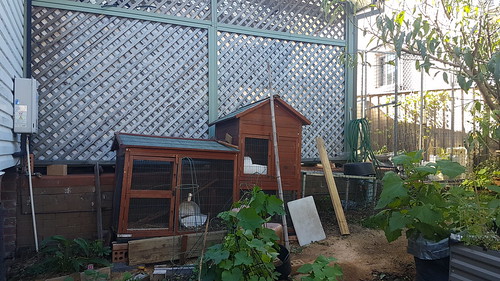
Let's do a quick lesson on the ethology (behaviour) of chickens.
Biologically, chooks are birds. Originally, they were jungle birds, accustomed to living among the leaf-littered forests of South East Asia and flying up into the low branches to perch every night so they'd be safe from ground predators.
They can fly, but not very high. They love scratching up the ground looking for bugs and worms and creepy crawlies, as well as for entertainment. They hang out in small flocks - maybe a dozen or two dozen birds. They have a literal pecking order, where there's a top bird (usually the rooster) and then a set hierarchy of birds. They are omnivores, like human beings; they will eat just about anything edible you put before them: meat and grain and green things and dairy, and their bodies can process it. (That said there are things where you should limit how much your chooks get. More about that in the next post - care and feeding.) They lay their eggs somewhere dark and 'safe', where they can get comfy while popping an egg out their oviduct.
What does all this mean for us humans as chook keepers?
It means chickens are best off somewhere where they can:
- scratch up the ground and pick at green things
- roost at night
- lay eggs
- safe from predators (including overenthusiastic 'helpers' of the small human kind)
This is pretty easy, right? Just put them in one of those chook coops and they're all good!
Well...not quite.
Let's talk about the chickens who lay the cage eggs you get in the supermarket.
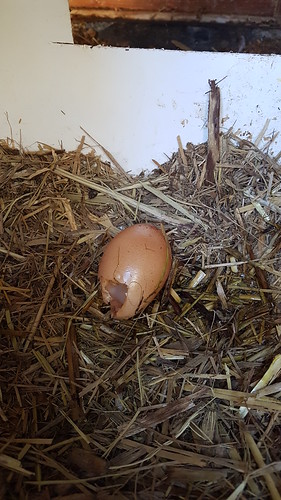
Cage Eggs
They're laid by a hen who's been bred to lay every day, some 320-350 eggs in a year of 365 days. The instant she starts laying regularly, she's shoved into a small box in a factory, amidst thousands of other chooks in small boxes, where she's fed as much food as she can handle, and left to lay eggs and shit all day. Her food is heavily medicated, because the conditions under which one keeps thousands of chooks in very small boxes never letting them out is not hygenic, and while their poop is carried away to be turned into 'rooster booster' or some such product, it still gathers flies and breeds infection and disease.
When she's about two years old, she'll stop laying. At that point, she's toast. I don't know precisely what happens to them because the egg companies don't tend to tell you. A handful (maybe 0.5% of the total) are rehomed to people who don't mind a hen with no social skills who lays occasionally rather than every day. But the rest of them? Well, let's just say it's not a nice retirement in a shady orchard with all the worm-infested fruit that they can handle. I can pretty much assure you of that.
This is the life of a battery hen. You are not seeking to emulate it.
Or maybe you are. Maybe you don't care how chooks are cared for (or even if they're cared for) so long as you get eggs? While it's not a view I personally hold, it's one that many people have to take because they need to feed their families and eggs from caged birds are cheap and convenient.
But you are here reading my blogpost, and I believe that we have it in us to define 'better care' of a chicken as rather more than merely "better than a battery hen".
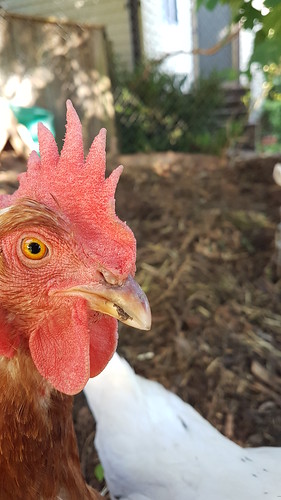
What about Free Range eggs from Free Range chooks?
So, Free Range chickens, by definition 'have access to' an area where they are free to range.
This is good, right? Like, if a kid's been kept in a small room all their life and suddenly they're in a house with a backyard that they can go out with, it's all okay, yeah?
Before the COVID-19 travel restrictions, how many kids did you see randomly out 'free ranging'?
Chickens are a bit like kids in some respect; they're creatures of habit and instinct and there's not a lot of reasoning up there in the brain. Your modern kid has access to the great outdoors...but they'd rather be inside, sitting on their devices.
So sometimes the chooks who produce the Free Range eggs that you buy in the supermarket have access to The Great Outdoors...but they don't know what to do with that terrifying open sky and that long green stuff, and that big place where...look, it's just safer being in the barn with the other thousand chooks on the free range farm. Also, because of the nature of chickens - being highly hierarchical - in the earlier days of 'free range chook farms' a lot of birds were debeaked so they couldn't peck each other to death while trying to find their position in the pecking order. Like someone pulling out your kid's fingernails so they' can't scratch the other kids when they go out and get into fights.
Now I don't know if that's the case anymore; public awareness has moved on a lot, but the gist is that 'free range' egg production may be better than 'cage' egg production, but it's still not really recognising that chooks are chooks.
There are free range farms that have 'chook cams' these days, so people can see the treatment of the chickens. I approve. I am also highly cynical by nature, so I question whether the chooks that are being viewed on camera are necessarily the chooks producing the eggs that end up in the cartons on the shelves. But that's my own suspicious nature, don't mind me!
Free Range egg farms are considerably better than Cage egg farms, but the simple fact remains: it's a commercial process. They're looking for maximum eggs out of minimum effort.
Maybe that's what you want, too: maximum eggs out of minimum effort.
I submit that if you want maximum eggs from minimum effort, just buy the eggs in the supermarket. Remember how I said it was easier in the series base post? It is. Seriously, it is so much easier. Even if you sometimes go to the supermarket and there are no eggs on the shelves, it is still easier to buy an occasional carton of eggs from the supermarket than labour through keeping chickens to get a dozen eggs.
But back to the keeping of chooks - and specifically, the housing of them.
The Basic Recommendation
The basic recommendation is:
a) a coop (location where they can roost at night)
b) a run (location where they can wander by day)
There are stats on how much space per chook, and details of the best types of perches and all that. I don't need to reiterate those.
What I'm going to mention are the things that a lot of sites frequently gloss over: the other things that chooks do apart from eat and produce eggs.
The Bad, The Worse, And The Stinky
They eat everything green that they can reach. They eat the grass. They eat clover. They eat your vegetables, and sometimes the new growth on trees if they can reach them. They love lettuces and Asian greens and brassicas, because the leaves are just soft enough for them to snap off with a clip of the beak.
They scratch up the soil in search of creepy crawly things. if you have mulch on beds, they will go for that. If you have vegetable beds, they'll dig around there. They're looking for bugs and earthworms, flies, slugs, grubs, and larvae, as well as insect eggs. Digging into the ground is the way they do that.
They make noise. Not crowing like roosters, but certainly loud enough to be annoying to neighbours who might like their quiet, or who might want a reason to dislike you. There's the steady clucking with a squawk of outrage. There's the loud 'where are you, we're bored' clucks that can go for an hour or more. There's the 'puff and ruffle' of hierarchy assessment and assertion.
They poop. In rather large quantities. It's smelly and stinky and sloppy and slimy. It attracts flies by the bucketload if it's left around. And if you want it for the garden...well, you have to let them into the garden, first. If you're not prepared to deal with chicken manure, don't get chooks.
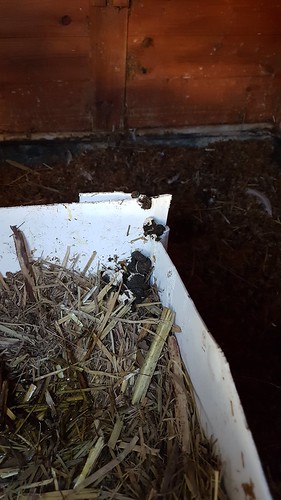
Basically, chooks do a lot of things other than lay eggs, and those things are an integral part of their nature. Trying to suppress them will mostly cause you angst and frustration and mess.
In short, chickens are living creatures that happen to produce eggs. To most people, a chicken is there to provide eggs and maybe a meal at the end of its life. The things like scratching up the lawn and garden, eating the leafy greens it comes by along the way, and the dollops of chook poop that lie randomly scattered across the ground are inconveniences that most people put up with in order to get the eggs.
That's the part that most people who've bought chooks for eggs haven't taken into account, and it's the part that's going to catch a lot of people unawares.
How do you deal with these things?
Well, you can take the 'caged chicken' view of things, and just shut them up somewhere where they get fed, lay eggs, and are bored. And once again, I say: if all you want from the chooks are eggs, then just buy them from the store.
You can let them out and deal with the hair-tearing frustrations of stepping in poop every time you walk into the pen, of having your garden dug up and your mulch relocated, of finding dusty, barren patches all over your lawn where the chooks have decided to dustbathe.
Or
The alternative is setting up a regular area for them to run around in, dig up, dustbathe, and generally do their thing.
Did I mention that chook keeping wasn't easy? This is the 'not easy' part of it.
Your garden will not be the pristine one shown in the Pinterest and Instagram pics that are used to sell chooks or chook products. It will be a mess. It will be a delightful mess if you love watching creatures being creatures, but most suburbanites want that nice clean lawn, no flies or insects, no poop all over the place, and no unsightly dust patches in the green.
Keeping chooks manifestly involves these things. There's just no avoiding it if you want happy, healthy chooks.
Now, note the 'if' clause in that statement. A lot of people won't care if the chooks aren't happy and healthy - after all, they're just dumb animals, right? Well, I reserve for such people the same blank stare that you would reserve for someone who bought a beautiful collie dog and kept it cooped up all day, never taking it out for a walk and shouting at it when it wanted attention. Or for people who fostered a kid and then treated them like an unpaid servant rather than a member of the family.
You have taken a creature into your household; that means you have taken on the responsibility of caring for it and seeing that it's not only physically looked after, but that it's life is as good as you can make it.
Am I a bleeding heart about animal care? Yes. Yes, I am. But people say that like seeing a creature bored and frustrated and wanting better for them is a bad thing.
The way most people who are aware of chook needs deal with the scratching, pooping, etc. is either to have the chook house within a chicken yard. That is, a place where the chickens can run around and scratch things up. They dump kitchen scraps and leaf mulch and grass clippings and woodchips into the chicken yard, and the chooks go to town on it. And every day or couple of days, the chooks are let out to go around the garden and yes, cause a bit of damage. Every couple of months, the chook roost and the chook yard are cleaned out and all that scratched-up and mulched compost matter is put on the garden beds.
You do you.
Thinking outside the box
I do...something slightly different.
As I said in my introductory post, I have been planning to get chickens for years. And I planned my ownership of them around the things that would have been frustrations to many suburbanites: the manure, the digging up, the relentless nibbling of every green thing in reach.
Based on Linda Woodrow's The Permaculture Kitchen Garden, I based my ownership of chickens such that the things that would otherwise be frustrations were part of the design.
This is a map of my backyard with the elements relevant to the chickens coloured in.
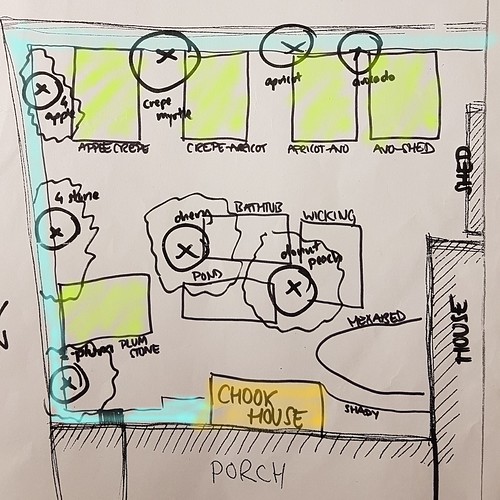
The orange section is the chicken coop or house, where the chickens lay their eggs and sleep at night, and sometimes get fed and watered depending on the season and the garden setup. The coop is also a shelter in the rain, although they don't always use it and don't mind getting wet.
The green sections are the annual garden beds where I grow vegetables.
The blue sections around the edge of the garden? Those are tunnels that connect the chicken coop to the garden beds.
Most of the time, the green sections - the garden beds - are not available to the chickens. But when I want the chickens on there (after I've finished growing things for a season and want to clean up the soil, bugs, remnants of the plants, etc), I put a 'chicken tractor' - a large wire-covered cage-like frame - over the top of the garden bed, and open up a little gate in the side of the tunnel so the chickens can come through and dig that area up to their heart's content. The beds are the exact size of the chicken tractor, and provide a space for them to dig, sit, scratch, and feed that is more than just the coop space.
They eat the spent remains of the vegies I planted there (most of which I have harvested).
They pick out any bugs that have been left in the area.
They poop onto the bed and then scratch it into the dirt.
They till the soil ready for the next planting.
We toss them food scraps from our kitchen, I add grass clippings from the front lawn and the neighbours, and oaten hay from the pet store. They scratch that around, digging up the ground as they do so, and not only aerate the the soil, but create a lovely surface mulch that keeps the moisture in once they're moved off.
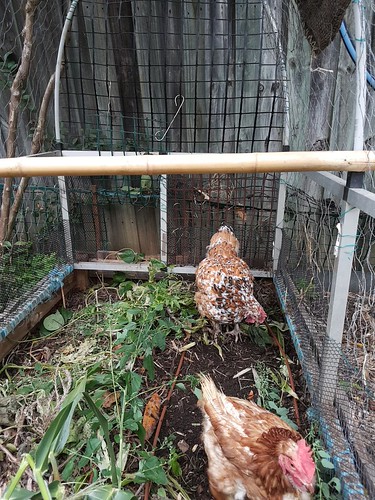
When the garden is eaten and dug up and pooped and mulched...I close up the door to the tunnels and take the tractor cage off, and I have a bed all ready for planting: fertilised, weeded, and tilled.
The tunnels around the edge are there for several reasons. I wanted a way for the chooks to move from the coop to the chicken tractor that I wasn't going to have to climb over (the original layout involved wire tunnels stretching across the yard), and then I wanted a way to keep the grass and weeds from the neighbouring properties from invading. Putting the chook tunnel next to the fence to deal with that was a perfect solution for both.
It takes effort and planning, yes. But the effort is relatively small and I'm prepared for it - rather more prepared than some new chook owners are prepared to deal with dusty patches in their lawn, scratched up flower borders, and shredded vegetable gardens and shrubs.
Yes, this is a specific setup with a specific purpose. I've set it up so that it works for me. You don't have to slavishly follow it - in fact, it's probably better that you don't. Work something out with the time and energy and effort that you have. But it's an example of how I'm using the properties of chickens that might usually be negatives for a suburbanite in a positive way.

I don't know what your setup is; I don't know if you planned for a 'setup' or if you just thought it would be eggs all the way down. But this post is to give you a slightly broader view of chooks - of the things they do simply being, and not just as egg-producers.
There are ways to manage the behaviour of chooks that will be less frustrating on you and won't condemn them to a life of boredom. Finding a system that works for you may take a while, though, so expect some upsets to your life.
And if chook keeping is not for you, there's no shame in saying so, and re-homing those chooks to someone who's prepared to give them a good life. My recommendation is to find a local FB gardening group and make inquiries about re-homing. There are people who'd be willing to add to their flock; indeed, I know a number of people who are just waiting for all the new chook owners to realise chicken keeping is not for them and who'd be glad to take chooks. Think about it.
If you're still on the page, the next post is 'care and feeding' - mostly about things to feed them (or not feed them) and a light skim of some of the things that can happen to them.
(And this time I will try to be a little faster with the next post.)







